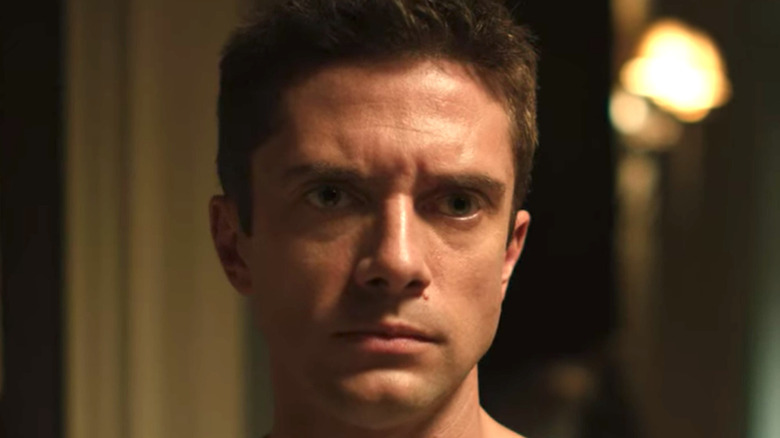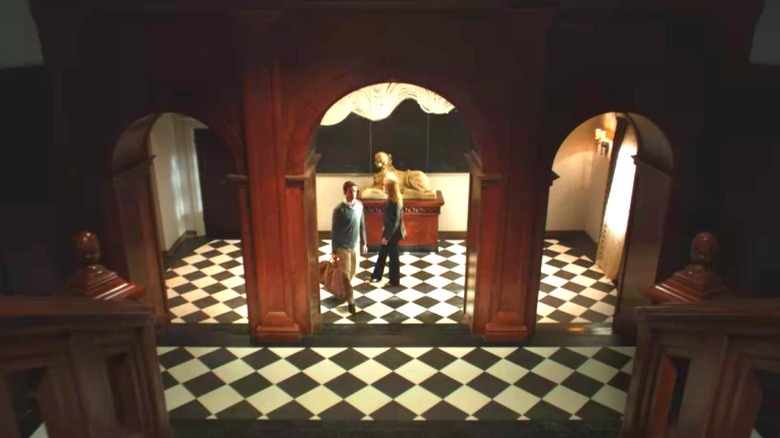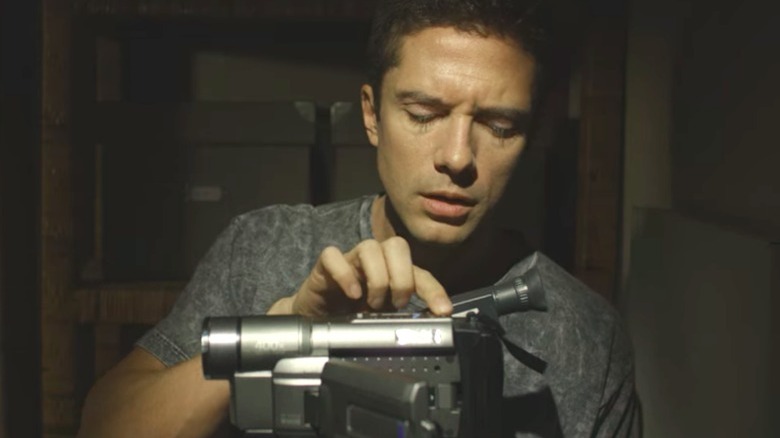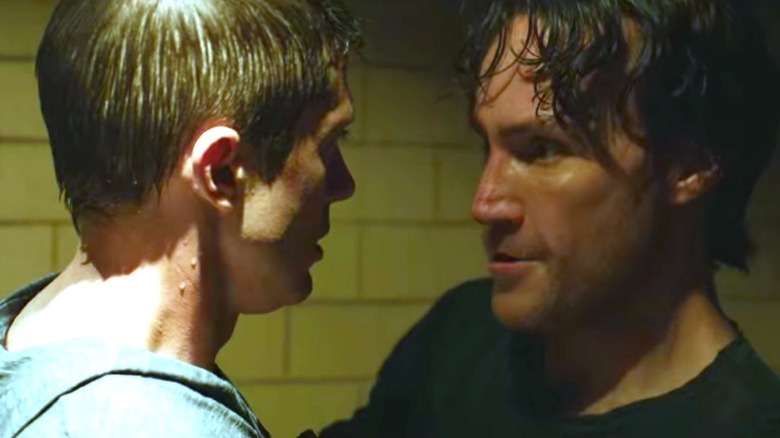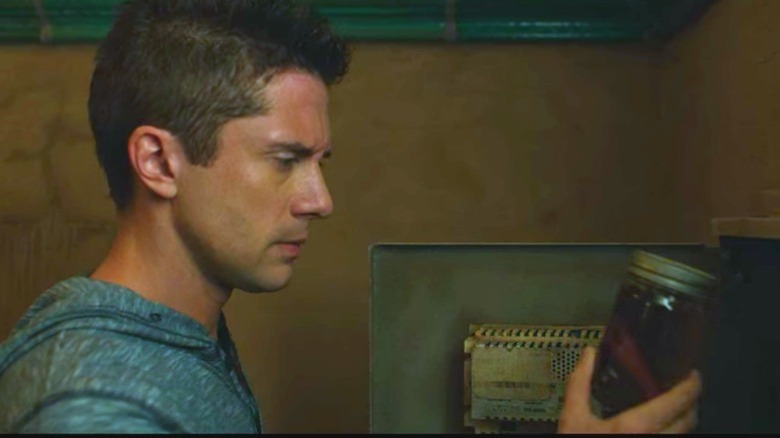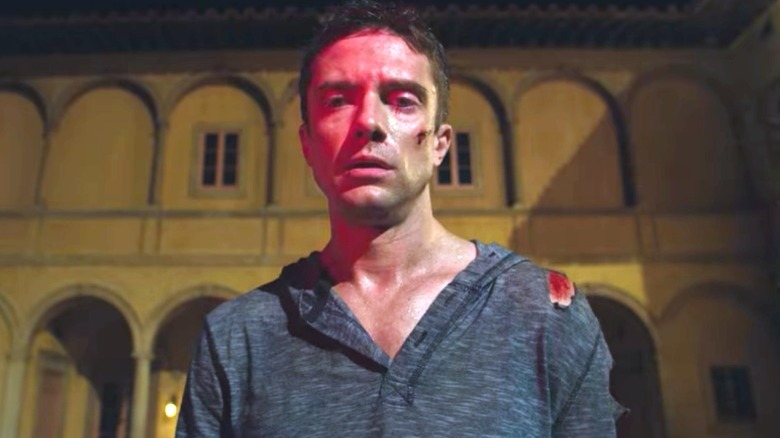The Ending Of Delirium Explained
The following article includes descriptions of domestic abuse, homicide, and assault.
"Delirium" is a 2018 psychological horror starring Topher Grace as Tommy Walker, a young man who has just been released from a mental institution after 20 years. The source of Tommy's mental illness stems from a childhood trauma where his older brother Alex (Callan Mulvey), drowned a female classmate and forced him to watch. Plagued by hallucinations and delusions, Tommy's mental health is further strained when his estranged father, Senator Walker (Robin Thomas), commits suicide days before his release. Now, with his mother having abandoned the family years ago, and his brother in jail, he is all alone.
As part of his initial parole, Tommy must live at his family's estate for 30 days, check in with his parole officer Brody (Patricia Clarkson), and verify he is at the house through a camera phone. As he tries to readjust to his new circumstances, his only respite comes in the form of a market employee named Lynn (Genesis Rodriguez) who delivers his groceries and takes an interest in his life.
Given Tommy's unreliable state of mind, both the audience and Tommy himself are constantly questioning whether what we see in "Delirium" is real, or an illusion inside his head. As strange events and bizarre circumstances escalate in the house, dark family secrets are revealed, and Tommy is forced to confront his traumatic past ... but what exactly is the truth?
The Walker family home is a physical representation of Tommy's psychological trauma
Whether genuine or imagined, the Walker family home is undeniably full of traumatic and unresolved memories. For Tommy Walker, every space occupies a certain sentiment and memory, and through the house we are taking a tour of his psyche. Upon arriving, he initially retreats to his childhood bedroom to relive happier memories of his boyhood, laying out posters and toys. This is indicative of his current childlike development, which simply doesn't have the emotional tools to face his suffering.
However, as the house begins to reveal its deranged proclivities and unbalanced practices, Tommy can no longer keep denying the truth. Tormented by both his brother's past actions, and his own inaction during the murder, he is forced to face his own negligence in the crime. Circumstances pulls him in deeper, and he eventually descends into the depths of the estate's dungeon. There he confronts the atrocities of his past, and by embracing these horrors, he is able to grapple with his own inner demons, allowing his life to move forward.
Peepholes and hidden cameras expose Tommy's father's compulsion to 'watch'
Tommy Walker's hallucinations are almost a way for him to subconsciously protect himself while still confronting his repressed internal wounds. For example, the visions of the girl drowning in the pool alerts him to his brother's attempt to seal him in the pool, and the presence of his father's dog attacking a corpse hint at the senator's true hidden nature.
After being forced to witness a murder, while being helplessly handcuffed, Tommy is haunted by what can't be unseen. He confides this to Lynn by remarking, "I couldn't do anything but watch that day." This is in stark contract to his father, as we see when Tommy comes across numerous items in the house that insinuate Senator Walker's preferences to peek at others.
There are the obvious contraptions, including a hidden door that leads to peepholes in every room of the house, as well as concealed filming equipment set up behind two-way mirrors. However, other more subtle clues include a stuffed puppy with a tag that reads, "To Watch Over You, Love Daddy." These revelations help Tommy to stop coveting his father's approval and take a look at the deeply twisted and flawed man underneath.
Alex considers his brother be his true partner, while Tommy does his best to fight back
After breaking out of prison, Tommy's brother Alex encourages him to witness further acts of violence, referring to him as, "My little peeping Tom." When he is preparing to murder Lynn he even exclaims, "I need my little peeping Tom and you need me!" Much like his father who enjoyed watching, it appears that Alex enjoys being watched by his brother, as some sort of affirmation of their bond. He considers them two parts of a whole, declaring during that initial murder, "I'm just doing what you couldn't. Sometimes it takes two men to make one brother."
Tommy, also, holds fears about his own inner demons. When he looks though the peepholes his father set up, he distinctly sees his own face staring back at him. The second time, it's Alex that looks back. Ultimately though, we see that the two men are nothing alike in their desires, temperament, and goals. Alex is only interested in his father's hidden money, and when they find their emaciated mother chained in the basement, Tommy comforts her with love, while Alex rejects her outright and shoots her.
Though they may share a bloodline, there is no justification here to equate their morality, righteousness, or ethics — something that Tommy finally realizes in his final rejection of Alex, wherein he plunges him to a watery death.
A severed tongue in a jar epitomizes the desire to speak up without the ability
Tommy's choice to be silent after Alex's crime is a huge weight for him to carry. Had he let someone know about what his brother had done, Alex may not have been able to kill a second woman. Lynn similarly feels powerless about not speaking out again the abuse she endured in high school. Most of us refuse to, or are unable to, speak out when we know we should — and the most visceral imagery of this concept is a severed tongue in a jar.
After finding the jar, Tommy initially assumes it is a hallucination, but is later horrified when he realizes that it is real. We eventually learn that Tommy's father cut out his mother's tongue, and caged her in the basement of the house. This reveal is foreshadowed in his father's suicide video when he laments that his wife began to "talk back" to him. But perhaps the most heartbreaking realization is that those unintelligible phone calls Tommy kept receiving in the house were his mother's desperate pleas for help.
We see Tommy break this cycle of silence when Lynn is attacked. He rushes to help her when spotted by Brody, but the parole officer is also permanently silenced when Alex slits open the back of her throat. With Lynn in danger, Tommy continues to wail, fight, alert the police, and even tears his restraints from the wall — refusing to be a silent and complicit audience in another murder.
After reconciling his inner demons, Tommy finally takes ownership of the house, and by extension, greater control over his mental illness
Whether what we witnessed in "Delirium" is real or not, the most important thing is that when Tommy Walker emerges from his home, he has faced and fought his deepest demons and survived the ordeal. He stated earlier that he knew he couldn't change the past, but going forward, he resolved, "To make the best choices I can, from here on out." And when given the opportunity, that's exactly what he does.
He proves to himself that when faced with the same situation as an adult, he would act differently, and do everything in his power to save a victim. He no longer idolizes his father, nor is he desperate for his approval. Also, knowing how much his mother loved him — and that she never abandoned him — gives him the closure he needed.
At the end of "Delirium" a police officer asks Tommy whether the house is his, to which he replies, "It is now." Whether the house represented Tommy's larger psychological wellbeing, or if it was just a house, one thing is clear — he has now taken ownership of his life, his mind ... and his house.
If you or someone you know is struggling with mental health, please contact the Crisis Text Line by texting HOME to 741741, call the National Alliance on Mental Illness helpline at 1-800-950-NAMI (6264), or visit the National Institute of Mental Health website.
If you or anyone you know has been a victim of sexual assault, help is available. Visit the Rape, Abuse & Incest National Network website or contact RAINN's National Helpline at 1-800-656-HOPE (4673).
